Mos2 is very old-school additive.
You are using an out of date browser. It may not display this or other websites correctly.
You should upgrade or use an alternative browser.
You should upgrade or use an alternative browser.
Liqui Moly MoS2 interesting sediment pics.
- Thread starter JTK
- Start date
The stuff is $6 and if that is causing drama for you financially, I'm just not sure what to tell you. I don't think it's strange that an oil company sells them, it's a profit maker for sure and LM sells lots of additives and heavily markets them. I just don't think they hurt a thing and *may* have some benefits so if a few bucks extra on your oil change makes you sleep better at night, go for it.Maybe MoS2 is a technology that outlived its usefulness and is not needed nor desired in modern engines. Liqui Moly offers it because it sells. I have no love for oil additives, and it's weird that an oil company peddles them. Though it's not as bad as Lucas Oil Stabilizer - bright stock with a 5000 percent markup. Marvel Mystery Oil, Slick 50, and others come to mind, all snake oil. What's so sad and deceptive about additives is that most of the time people who couldn't afford to take care of their vehicles to begin with, fall on hard times and look at these products as solutions - kind of like a mechanic in a bottle. I'd love to see at least a bit of effort put into educating the general public about these additives.
I admit I used LM MoS2 to make the Mini's dipstick readable. This dipstick is the worst I've ever seen. Hard to read with clear oil.
- Joined
- Jul 26, 2021
- Messages
- 201
I'd rather push the $6 towards better oil.The stuff is $6 and if that is causing drama for you financially, I'm just not sure what to tell you. I don't think it's strange that an oil company sells them, it's a profit maker for sure and LM sells lots of additives and heavily markets them. I just don't think they hurt a thing and *may* have some benefits so if a few bucks extra on your oil change makes you sleep better at night, go for it.
This MoS2 stuff reminds me of the Arco Graphite oil from the 70's. It's also been copied in other parts of the world, believe it or not.
Putting goop in my expensive engine doesn't make me sleep better, so I don't do it. In fact, I would seriously question my own sanity if I'd do something like that.
Then, there is also the Sunk-Cost Fallacy: once people are invested into something, further investment is warranted, otherwise previous investment is lost. This is not limited only to money. This kind of behavioral economics is what most of these additive manufacturers bank on.
The conversation inside these companies goes something like this:
- Management: Can you formulate a product that makes us money and includes some cool ingredient - for marketing purposes?
- Lab: Yes, we can.
- Management: Will it have benefits for the end user?
- Lab: Absolutely none!
- Management: More importantly, will there be any short term damage from the use of our product?
- Lab: Absolutely none. And unless we conduct long term tests with tear-downs, we will never know what the long term implications are.
- Management: Excellent! Yes! Please make it just like that!
Last edited:
Our Lexus RX350 is that way - I hate it. Really hard to tell when the oil is fresh where it is. Have to use a flashlight! The MoS2 definately darkens it up - I run it in my W8 and can see the oil v. clearly.I admit I used LM MoS2 to make the Mini's dipstick readable. This dipstick is the worst I've ever seen. Hard to read with clear oil.
Yep - they push the Ceratec as the modern/new-school one.Mos2 is very old-school additive.
Folks swear by the Lucas stuff on older cars - I remember running STP (same thing right - bright thick oil) in an old Subaru I had to keep the oil burning down.Adding a quart of Lucas Oil Stabilizer and a bottle of MoS2 to a 6~7 quart sump should give anyone the ultimate protection! The Lucas will make sure the MoS2 sticks everywhere inside the engine and doesn't fall out of suspension.
So by your logic, why is anyone using anything buy Supertech? Is there any data/proof that using M1 for example provides one ounce of added value vs. the budget brands? Are there long term tests on cars showing it? Why do you spend the extra $8 on it? You do it b/c it makes you feel better plain and simple and you know what? That's cool. It's why many of us do what we do as consumers. Why buy Fruit Loops when you can save a buck and buy the store brand Fruti-E-Os? Prove that it tastes worse.I'd rather push the $6 towards better oil.
This MoS2 stuff reminds me of the Arco Graphite oil from the 70's. It's also been copied in other parts of the world, believe it or not.
Putting goop in my expensive engine doesn't make me sleep better, so I don't do it. In fact, I would seriously question my own sanity if I'd do something like that.
Then, there is also the Sunk-Cost Fallacy: once people are invested into something, further investment is warranted, otherwise previous investment is lost. This is not limited only to money. This kind of behavioral economics is what most of these additive manufacturers bank on.
The conversation inside these companies goes something like this:
The fact that most, if not all, owner's manuals specify that the use of additives voids the warranty, also works in the additive manufacturer's favors. I mean, who's gonna go after them? John Doe "Blown Engine" doesn't have the resources to conduct long term tests, pay experts, and hire the legal horsepower to take them down. The. FTC? They couldn't care less. So no, oil additives don't have to even show the hint of a benefit, they just have to not break or damage anything. The logic behind how they work, or not work, and their marketing, boggles the mind.
- Management: Can you formulate a product that makes us money and includes some cool ingredient - for marketing purposes?
- Lab: Yes, we can.
- Management: Will it have benefits for the end user?
- Lab: Absolutely none!
- Management: More importantly, will there be any short term damage from the use of our product?
- Lab: Absolutely none. And unless we conduct long term tests with tear-downs, we will never know what the long term implications are.
- Management: Excellent! Yes! Please make it just like that!
Yes actually there is proof. It depends on the exact variant you’re using but some Mobil 1 types carry far more stringent approvals and specifications than any Supertech variants do. These approvals and specifications are the real world proof that it’s better.So by your logic, why is anyone using anything buy Supertech? Is there any data/proof that using M1 for example provides one ounce of added value vs. the budget brands? Are there long term tests on cars showing it? Why do you spend the extra $8 on it? You do it b/c it makes you feel better plain and simple and you know what? That's cool. It's why many of us do what we do as consumers. Why buy Fruit Loops when you can save a buck and buy the store brand Fruti-E-Os? Prove that it tastes worse.
It’s not about feelings it’s about the proof that those approvals and specifications represent.
I admit I've done the same, it wasn't LM but it was MoS2/graphite mixI admit I used LM MoS2 to make the Mini's dipstick readable. This dipstick is the worst I've ever seen. Hard to read with clear oil.
Many Mini owners call it "the worst dipstick ever".

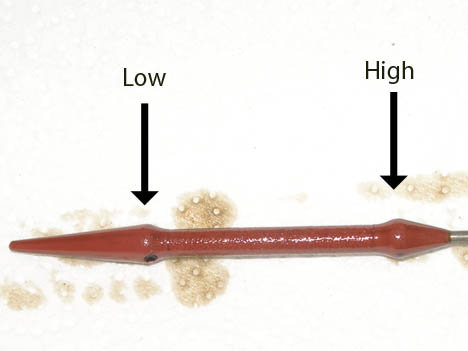
The main problem isn't the dipstick itself though. The main issue is the S-shaped dipstick tube - exactly that way:
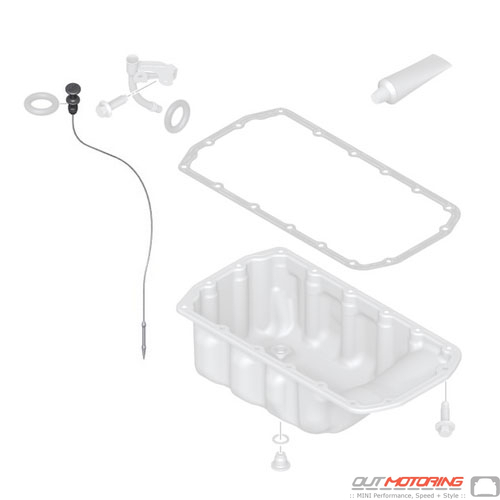
For this reason, the dipstick gets oily again anytime you pull it.
I just place the car in my garage, pull the dipstick, put a towel onto the dipstick tube
and check oil just next morning. There's just one try, the second one is again harder
to read. Proper sunlight helps.
.



The main problem isn't the dipstick itself though. The main issue is the S-shaped dipstick tube - exactly that way:

For this reason, the dipstick gets oily again anytime you pull it.
I just place the car in my garage, pull the dipstick, put a towel onto the dipstick tube
and check oil just next morning. There's just one try, the second one is again harder
to read. Proper sunlight helps.
.
I see the issue! s-shaped tube and a round end dipstick. I would get a second dipstick, and sand it flat on two sides and see how that works, should scrape less oil that way.Many Mini owners call it "the worst dipstick ever".



The main problem isn't the dipstick itself though. The main issue is the S-shaped dipstick tube - exactly that way:

For this reason, the dipstick gets oily again anytime you pull it.
I just place the car in my garage, pull the dipstick, put a towel onto the dipstick tube
and check oil just next morning. There's just one try, the second one is again harder
to read. Proper sunlight helps.
.
That's exactly what some people did, they just filed it flat:
https://www.northamericanmotoring.com/forums/stock-problems-issues/253015-dipstick-fix.html
https://www.northamericanmotoring.com/forums/r56-hatch-talk-2007/325966-dipstick.html#post4381349
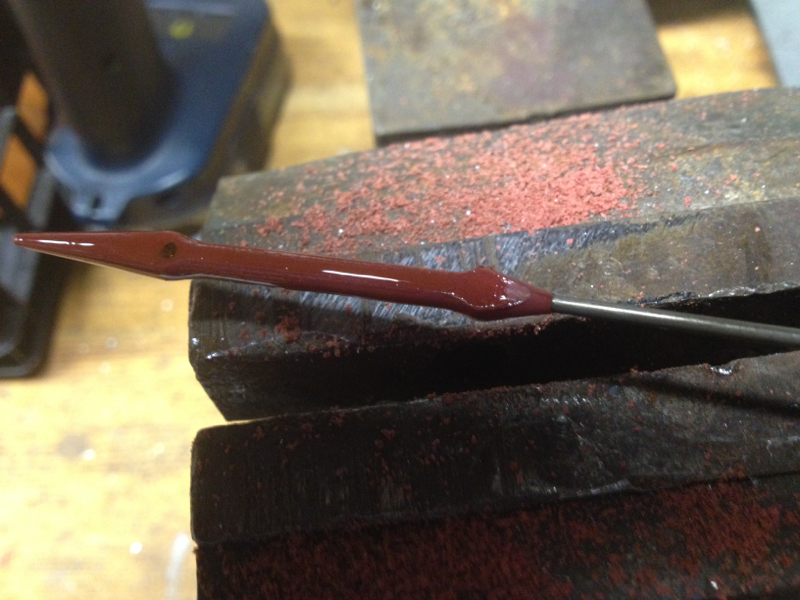
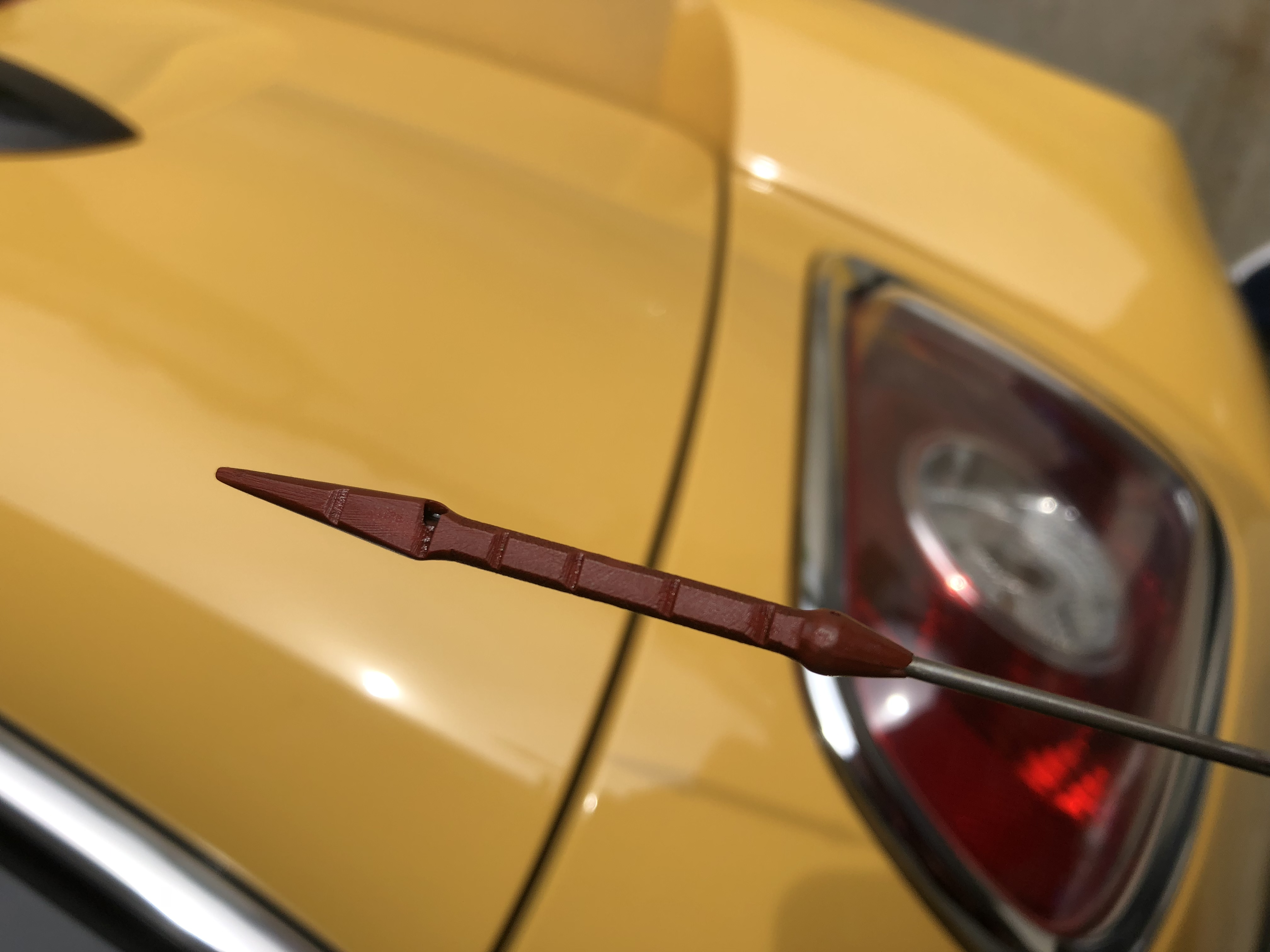
https://www.northamericanmotoring.com/forums/stock-problems-issues/253015-dipstick-fix.html
https://www.northamericanmotoring.com/forums/r56-hatch-talk-2007/325966-dipstick.html#post4381349


Get your dipsticks into this fellas if you keen:
https://link.springer.com/article/10.1007/s11249-019-1198-z
https://link.springer.com/article/10.1007/s11249-019-1198-z
- Joined
- Jul 26, 2021
- Messages
- 201
@JTK you're wasting your time with goop, MoS2, Lubetech, and other crap. Just enjoy your sweet sweet truck man, and watch the following video starting at minute 8:45:
"No movement" - clearly b/c the prev. owner used MoS2
- Joined
- Jul 26, 2021
- Messages
- 201
As neglected as that Bentley-wanna-be-pos-mobile in the video was, it barely saw oil, and I mean, *any* oil."No movement" - clearly b/c the prev. owner used MoS2





Look @TiGeo, obviously I don't know much about Liqui Moly or the Lubetech stuff, so I won't pretend that I do. I just don't use additives as a general principle. If it does something for your vehicles, than that's great. Somehow I doubt that this stuff can do anything for a WWII-era basic low-tech push rod engine design. Fifty years ago engine lubricants weren't what they are today, yet those engines somehow survived and performed. Now, all of a sudden, special lubes and additives are needed for them. Logically, this is indicative of a quality control issue that no goop, no matter how fancy, can fix. Maybe it's something that doesn't happen that often, and maybe it was already addressed during manufacturing. So there is no point in using something that might do more harm than good just out of fear.
The issue you and others have in these convos seems to be... nobody or company is saying you need them. Just something extra for those that want them that feel that this gives them something extra. Yes, an approved/spec oil will be fine for just about any use a normal person could throw at it and no additional additives/snake oils/goops needed.As neglected as that Bentley-wanna-be-pos-mobile in the video was, it barely saw oil, and I mean, *any* oil.
Look @TiGeo, obviously I don't know much about Liqui Moly or the Lubetech stuff, so I won't pretend that I do. I just don't use additives as a general principle. If it does something for your vehicles, than that's great. Somehow I doubt that this stuff can do anything for a WWII-era basic low-tech push rod engine design. Fifty years ago engine lubricants weren't what they are today, yet those engines somehow survived and performed. Now, all of a sudden, special lubes and additives are needed for them. Logically, this is indicative of a quality control issue that no goop, no matter how fancy, can fix. Maybe it's something that doesn't happen that often, and maybe it was already addressed during manufacturing. So there is no point in using something that might do more harm than good just out of fear.
- Joined
- Jul 26, 2021
- Messages
- 201
Ceratec seems more interesting than MOS2 though. Are there any real world benefits of using it? Engine oil additives are tricky, but Ceratec seems to be something else. What can you tell me about it?The issue you and others have in these convos seems to be... nobody or company is saying you need them. Just something extra for those that want them that feel that this gives them something extra. Yes, an approved/spec oil will be fine for just about any use a normal person could throw at it and no additional additives/snake oils/goops needed.
Similar threads
- Replies
- 43
- Views
- 2K
- Replies
- 0
- Views
- 572
- Replies
- 11
- Views
- 315
